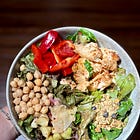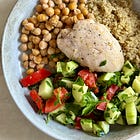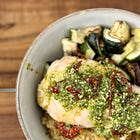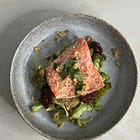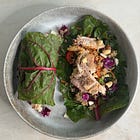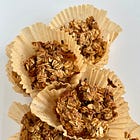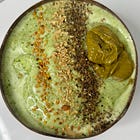Good mood foods: 8 habits I do daily to support a healthy gut and a better mood
The food you eat directly impacts how you feel. Here are 8 habits that I've incorporate to support a healthy gut and an improved, more balanced mood.
Did you know “90% of your serotonin (the feel-good hormone) is produced in your gut”?1 That means the foods you eat directly impact your mood, energy, and the way you show up every single day.2 Your gut isn’t just important for your mood, but it is the key piece in how your body takes in nutrients and supports your overall health.3
Our bodies are amazing, made up of many systems that come together to support us so we can show up as us every single day. But, it’s important that we enable them with nourishing foods and habits. Now that you know the importance of your gut on your overall health, here are ways I have found best support my own gut health.
Disclaimer: Please note that the information provided here is based on my own experiences only and should not be considered as personalized nutrition advice. I am not a registered dietitian and cannot provide medical or dietary guidance for specific health conditions. Always consult with a qualified healthcare professional before making any significant changes to your diet.
8 habits I use to support a healthy gut
Incorporate more fiber-rich foods4
Add fermented foods5
Limit ultra-processed foods
Stay hydrated
Eat slowly and mindfully
Manage stress
Prioritize quality sleep
Regularly move my body
1. Incorporate more fiber-rich foods
Fiber supports a healthy gut by supporting your digestive system and properly removing what is no longer needed in your body.6 Fortunately, foods high in fiber include:
Legumes (beans, chickpeas, lentils)
Fruits (apples, bananas, grapes, peaches, pears, watermelon)
Vegetables (artichokes, kale, lettuce, squash, zucchini)
Whole grains (buckwheat, quinoa, oats, brown rice)
Nuts and seeds (almonds, cashews, peanuts, pumpkin seeds, walnuts)
Wholesome ingredients offer a range of nutrients, but diversity matters too. Adding lots of color and variety to a plate is a great way to get in more nutrients. According to Harvard Medical School, eating a beautiful variety of colorful foods is important because of “phytonutrients, which protect us from chronic diseases.”7 Since produce grows in the wild, it naturally has mechanisms to protect it from pests. Once we consume that produce, we are able to reap some of the benefits of those mechanisms for our own bodies.
Eat the rainbow with a variety of these foods added to your plate:
Red: beets, cherries, cranberries, pomegranates, raspberries, red apples, red bell peppers, red grapes, strawberries, tomatoes, watermelon
Orange and yellow: apricots, bananas, bell peppers, butternut squash, cantaloupe, carrots, corn, lemon, oranges, papaya, peach, pears, persimmons, pineapple, pumpkin, sweet potatoes
Green: arugula, asparagus, avocado, bell pepper, Bok choy, broccoli, Brussel sprouts, cabbage, celery, cilantro, collard greens, cucumber, edamame, green beans, kale, kiwi, lettuce, mustard greens, parsley, peas, spinach, Swiss chard, thyme
Blue and purple: blackberries, blueberries, carrots, eggplant, grapes, plums, purple cabbage, purple yams
White and brown: beans, cauliflower, coconuts, dates, garlic, lentils, mushrooms, onions, potatoes, turnips, white peaches
Want help building balanced, gut-supportive meals from this rainbow of foods? My paid subscribers get weekly meal plans that do all the thinking for you—complete with grocery lists and recipes. Upgrade to a paid subscription today!
2. Add fermented foods
Not only does fiber support a healthy gut, but fermented foods add even more diversity to your gut flora, adding another boost in nutrients.
Some of my favorite fermented foods include:
Kimchi, which is great on an Asian-style dish
Sauerkraut, which I love on a salad
Pickles, which are delicious on a lettuce-wrap burger or in a burger bowl
3. Limit ultra-processed foods
While ultra-processed foods (chips, cookies, microwave meals, fast food) seem like a convenient option, they are often packed with ingredients that are less than ideal when it comes to health. By prioritizing nourishing real-food ingredients a majority of the time, you will be able to support your body best.
Bonus tip: If a product has a long ingredient list (especially ones you can’t pronounce), it likely falls into the ultra-processed category.
Here are some easy ways to make healthy eating easier:
Buy pre-chopped or pre-washed veggies
Batch cook once a week
Grab high-quality protein shortcuts (ex. Organic rotisserie chicken)
Keep a stock of frozen fruits & veggies
Bonus tip: If you don’t want to spend the time or mental energy on choosing recipes or building a plan, I’ve got you! Upgrade to a paid subscription, where you unlock access to the full weekly menu, grocery list, all the recipes, and a prep guide so you can save time and eat healthy.
Recipes to support a healthy gut
Each recipe I share is packed full of macro and micronutrients because I want to support my body well while enjoying the delicious flavors of a meal.
“Grace’s recipes leave me feeling energized and ready to take on the day! I can’t recommend them enough! ”
Matt, college student & engineering intern
Here are some recipes that are packed full of nutrients:
4. Stay hydrated
Keep reading with a 7-day free trial
Subscribe to Grace & Greens to keep reading this post and get 7 days of free access to the full post archives.







